The future Deacon Andrei Psarev left for the United States during the perestroika years. Today he is one of the most senior teachers at the legendary Holy Trinity Seminary in Jordanville, and a researcher of the history of the Russian Orthodox Church Outside of Russia. We spoke to Father Andrei about renowned alumni of the Seminary, the difficulties of life as a seminarian, new historical discoveries, the distinctive Russian culture abroad, COVID-19, the causes of the Black Lives Matter phenomenon, and life lessons in the Church.
You moved to the USA in the early 1990s. Has this country become a second home for you? Do you not miss Russia?
I came to Holy Trinity Orthodox Seminary (HTOS) from the Moscow region in August 1990. I had two intentions: to become a deacon and to return to my native country. The former has been accomplished, but as to whether the latter will, I do not know. I joke that my country ceased to exist in 1991. America became my first home. I am very grateful to America for showing me how to treat people with respect and to put oneself in the shoes of one’s neighbor. The overwhelming majority of what I do is connected with the Russian Orthodox Church. It could be said that I am sick for Russia, and this is a sickness that cannot be cured.
You have been in Jordanville for quite a long time. Is it fair to call Holy Trinity Seminary one of the best in the world? What is your personal assessment of the level of education in the seminary, and what strong points would you emphasize in comparison with other seminaries?
Our new dean, the musicologist Dr. Nicolas Schidlovsky, is working hard to make Holy Trinity Seminary a place that prepares clergymen who are able to meet the demanding expectations of their flock. With the knowledge I have of my fellow faculty and seeing how invested they are in their subjects, I can state with confidence that the seminarians receive ample attention in solving academic problems as well as a high-quality education in church disciplines, theology, and the humanities. We have an excellent teacher of New Testament Greek, Hegumen Cyprian (Alexandrou). Ms. Elizabeth Purdy is one of just a few trained specialists in Church Slavonic in the United States. Fr. John Boddecker is one of the equally scarce Orthodox Hebraists out there. Fr. Demetrios Harper is the author of a book on the ethics of Saint Maximus the Confessor, recently published by Saint Vladimir’s Seminary Press. And Fr. John Malcolm works to have our alumni certified as clinical consultants; this will give them the opportunity to work as hospital chaplains.
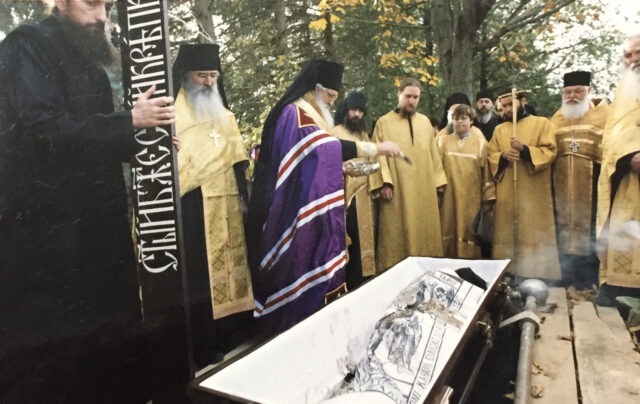
A monastic burial led by Archbishop Laurus. Late 1990-s. Photo: Yuri O. Fokin
A strong point of the seminary continues to be participation in a genuine ascetic tradition that goes back, in turn, to the traditions of the Holy Dormition Lavra in Pochaev, as well as immersion in the liturgical cycle of the Orthodox Church. The Rector of the Seminary is Bishop Luke (Murianka) of Syracuse, who is also a professor of Patristics; he joined Holy Trinity Monastery in the mid-1970s.
Russia was easier to idealize and to love from afar. Both sides of this encounter experienced a culture shock.
Which of the Jordanville fathers is most memorable for you and stands out in your mind in a good way?
When the Berlin Wall fell in 1989, the feeling in West Germany was that, if they could have, they would have built it themselves, since life became saturated with new problems in the wake of this encounter between East and West. To a certain extent, the same could be said about attitudes in the Russian diaspora. Russia was easier to idealize and to love from afar. Both sides of this encounter experienced a culture shock. The diaspora church was a kind of worldwide community in which people possessed a single common cultural code, often knew one another’s parents or were even related to each other, and shared a love for traditional worship and church singing that was common throughout the diaspora church.
Now, following the reunification in 2007, the feeling of defensiveness with respect to the “new arrivals” has somehow become barely noticeable. Yet in the early 1990s, it was very acute. It was in these conditions that Monk Isaakii (Schotter), a seminary instructor, became a refuge for “Soviet” seminarians. Perhaps it was by virtue of the fact that he was, so to speak, an outsider, an Englishman who had become Orthodox, yet Father Isaakii understood our situation.
At the same time, as someone who had served for years in the British Armed Forces, he showed us an example of service. I remember his words to seminarians: “You are only ill when the ambulance comes for you!” He himself, despite being terminally ill with cancer, came to carry out his obedience in the seminary as if on autopilot until his final days. People often say: “Until we meet again in eternity!” If this will be possible, it will be a joyous reunion for me, since Father Isaakii is one of the people I miss.
As the editor of Pravoslavnaia Rus′, I worked closely for many years with Metropolitan Laurus. Metropolitan Laurus witnessed through his life how one ought to treat other people. He had time for everyone who approached him, regardless of whether the person was important or not. Even if someone had committed a crime, he did not abhor people who were in distress. I remember how in one such case, the Metropolitan said in a heartfelt way: “Bear ye one another’s burdens.” It was clear how he worried about his fellow brethren.
Continuing on the subject of Jordanville personalities… could you name five to ten of the most outstanding alumni of Holy Trinity Seminary?
I think that all those who wish to share the teaching of Christ with the people of God and the world, and who have come to the seminary for this purpose, are outstanding people. “The Church is made of ribs, not timbers”, as the Russian saying goes. Over its 75-year existence (since 1948), the seminary has given to the Church of Christ bishops, clergymen, monks, and faithful laymen who have become the “ribs” of the Russian Orthodox Church Outside of Russia and who deserve to be remembered by name.
Dimitrii Alexandrov, another graduate of the seminary together with him in the first class of 1958, was for a long time the sole edinovertsy (Old Rite) Bishop in the Russian Church, Bishop Daniel
I would like to point out some aspects of the life and work of some of our alumni that are not yet sufficiently known. In spite of the fact that his secondary education was interrupted by the War, Archbishop Alipii (Gamanovich) authored one of the best Church Slavonic textbooks in existence. Dimitrii Alexandrov, another graduate of the seminary together with him in the first class of 1958, was for a long time the sole edinovertsy (Old Rite) Bishop in the Russian Church, Bishop Daniel. Despite knowing that his earthly life was coming to an end, Protopresbyter Valerii Lukianov continued to preach with joy in the Lord. Archimandrite Roman (Krasovskii), as head of the Ecclesiastical Mission, stabilized the situation of the ROCOR in the Holy Land. The congregation of Saint John the Baptist Cathedral in the capital of the USA, where the rector is the Mitred Archpriest Victor Potapov, while using two liturgical languages at services, is a single whole and, moreover, takes active part in social ministry. The Mitred Archpriest Petr Perekrestov, sacristan of the San Francisco Cathedral, was editor of the journal Russkii pastyr′, which reflected the spirit of HTOS seminarians. Priest Nikolaj Kostur, a cleric of the Midwestern Diocese of the Serbian Orthodox Church, has written two original works on the history of the ROCOR. Read Ivan Zhigalin is working with prisoners in a high-security prison in Australia, as is Mikhail Steblin-Kaminskii with drug addicts in Saint Petersburg. Yet another graduate, Juris Narnickis, founded a successful logistics company in Latvia.
Talking about the seminary students as a whole, one wonders: Who are the Jordanville seminarians? Do they all become priests and if so, is this only in the jurisdiction of the Russian Orthodox Church and the ROCOR? Are there a lot of students from Russia?
We have around 30 Bachelor’s and Master’s students, and 18 more in the distance-learning program. The bulk of the students are from North America. Among them, one might single out the so-called P.K.s (priest’s kids), the children of ROCOR clergymen. Members of the Serbian Church in North America have also traditionally studied at our seminary. A number our alumni have made good pastors of the Serbian Orthodox Church. Apart from seminarians from North America, we have students from Spain and the Philippines.
When I began studying in the 1990s, there were 21 people in our class, the majority of them from the USSR (in that graduating class of 1994, there were only 7 altogether). The fall of the Iron Curtain made Holy Trinity Seminary attractive for school leavers from the former USSR. Until the end of the first decade of this century, the instruction was all in Russian. However, Russian was not a common language for all students and American candidates for admission, whether of Russian origin or converts to Orthodoxy. English is far more suitable for the mission of a lingua franca. After we shifted to using English in the educational process, we were able to attract a category of candidates who otherwise would not have applied, since not everyone can learn Russian to the required level.
I think that the main problem is that our Church is insufficiently acquainted with the academic and scientific processes occurring in Holy Trinity Seminary and their importance for the Church Abroad.
What problems does the seminary face today?
I think that the main problem is that our Church is insufficiently acquainted with the academic and scientific processes occurring in Holy Trinity Seminary and their importance for the Church Abroad. Apart from the major education at the Bachelor’s level, we also provide more advanced Master’s education. In this way, we are able to train personnel of our own, whom we do not have to “export” from other Churches. They are to be able to facilitate the development of our Church by serving as experts in church matters.
Our parishes are generally not able to provide a pastor with a material allowance sufficient to allow him to concentrate fully on his ministry
It is not easy for a seminarian to become a priest. He dedicates the most strategically important years of his life to the seminary. His secular peers spend their twenties on obtaining an education that allows them to have a decent standard of living, but our parishes are generally not able to provide a pastor with a material allowance sufficient to allow him to concentrate fully on his ministry. As far as I am aware, for example, the question of parishioners’ contributions to the clergy has not been reconsidered for decades.
In order to solve this problem, we must collaborate with ROCOR hierarchs about concrete measures on their part that could improve the material situation of our pastors.
There are no pensions for clergymen, choir directors, or seminary instructors. Consequently, circumstances require that apart from their four years in Jordanville, seminarians have to acquire a secular profession and skills that can make them money either before or after they come here. The priest’s wife and their children are indirect hostages in this situation. It is thus not easy for them to establish and maintain a family. This harsh reality partially explains why our graduates often do not fill clergy vacancies in the ROCOR. In order to solve this problem, we must collaborate with ROCOR hierarchs about concrete measures on their part that could improve the material situation of our pastors. The existence of continual care and collective support might inspire those who are considering applying to Holy Trinity Seminary in the future.
Jordanville is not only an educational institution but in the first instance a monastery. How have the COVID-19 pandemic and resulting restrictions affected monastery life?
My role in Jordanville is limited to teaching in the seminary and serving as a deacon in the monastery. I would say that the circumstances of the pandemic that have come upon us have given us a shake and shown us that we must remain Christians under any conditions.
On the subject of your teaching or, rather, academic work: you are known as a researcher of the history of the Russian Church Abroad. Could you share with our readers what the most significant discoveries in this area have been in recent years? How important is it for people to know in Russia today about the life of the Russian diaspora church?
I would like to begin by talking about the book The Legislation of the Russian Orthodox Church Outside of Russia (1921–2007), which was published by Saint Tikhon’s University Press in 2013. It is by Dimitrii Pavlovich Anashkin, a class of 1998 graduate and my friend and colleague from HTOS, who died suddenly in 2018. He put together a one-volume thematic collection of all the legislative acts of Councils, Synods, and particular diocesan bishops. Prof. Andrei Kostriukov, an assistant professor in history at Saint Tikhon’s University for the Humanities in Moscow, has published three monographs since 2007 on the history of the ROCOR between 1921 and 1964. Currently, he is working on yet another. Saint Tikhon’s University is the leading academic center studying the history of the Russian Church Abroad. The works of Prof. Andrei Popov (assistant professor at the Institute of History and Archives of the Russian State University of the Humanities) on the study of sources from the Russian church diaspora are without precedent.
The works of Alexander Valerievich Slesarev, Vice-Rector for Research at the Minsk Theological Academy and Seminary, were a recent discovery for me; he has conducted pioneering research into the Belarusian ecclesiastical underground and diaspora, including within the ROCOR. The works of the Rev. Dr. Nikodim (Khmyrov), a hieromonk and teacher at the Saint Petersburg Theological Academy who in 2019 published the monograph The ROCOR Journal “Tserkovnye Vedomosti” from 1922–1925, show real promise. And these are only just a few names from former Soviet states.
Researchers within Russia thus need no convincing about the importance of studying the history of the Church Abroad; rather, the convincing nowadays needs to be done in the diaspora, where the value of professional historical research and the need for Jordanville to be an academic center for the ROCOR is far from obvious to a great many people. In such circumstances, I am grateful to the ROCOR Fund for Assistance and the Otrada American-Russian Aid Association, which have supported the development of my ROCOR Studies Internet hub. By the end of the year, I hope, a new version of the site will go public that will attempt to bring home the value of historical research methods to readers outside of Russia.
August 2021 will mark the 100th anniversary since a Council of the Church of Serbia adopted a resolution granting canonical protection to Russian refugee bishops. In this connection, I hope to conduct an international conference in Serbia in November of next year on “Links between Times: Conclusions and Perspectives. On the Centennial of the Russian Church Abroad”.
Throughout your many years of research, you have presumably collected quite a few facts about the life of the Russian Church in the diaspora. What has shocked or struck you the most and made the greatest impression on you? For which émigré figures have you developed a genuine love and respect by finding out hitherto unknown facts about them?
The self-sacrificing service of many pastors of the Russian Church in the emigration fits into some kind of iconic image of ministry “for the sake of Jesus Christ, rather than a morsel of bread” [a rhyming Russian expression: radi Khrista Iisusa, a ne khleba kusa —trans.]. This was vividly expressed by Archpriest Georgii Benigsen, who served in the Pskov Ecclesiastic Mission during the War, in the ROCOR in the immediate post-war years, and later in the OCA:
“Wherever we had been, we left last, doing our work to the bitter end with unfailing resolve, in the knowledge that our cause was that of the triumph of Christ… We went with the people, yet again leaving our native lands, leaving behind victims who fell under the bullets of partisans and Gestapo agents alike or who simply resolved not to leave or could not leave in time. We went Westward, knowing that we could not expect any mercy from the Bolsheviks, knowing the Soviet regime just as well as the German one this time around. We often heard our hearts saying: stay here, share in the fate of those who have taken up the cross of martyrdom, who are suffering for Christ in exile and concentration camps in the boundless expanses of Siberia. But yet another voice was calling us Westward, saying that that’s not all there is, and that they know the truth in the West and will be able to stand up for the truth.”
The year 1991 marked the 20th anniversary of the death of Archbishop Leontii (Filippovich) of Chile. I was editor of Pravoslavnaia Rus′ at the time and was attracted by the figure of him as a bishop of the Catacomb Church in Russia, who remained out of communion with Metropolitan Sergii (Stargorodskii). This interest was reflected in my Bachelor’s thesis, which I hope will at some point appear in an expanded and corrected form. Upon further study, the historical reality turned out to be different than how it had been presented before: it turned out that n Russia Vladyka Leontii was in communion with the Patriarchate of Moscow. What is more, after joining the Russian Church Abroad in 1944, he began to combat “renovation and modernism” within it. This example shows us how far historical reality can be from our stereotypes.
Which ROCOR parishes can be considered today to be preserving the traditions of the past, of Tsarist Russia? Have many émigré families and individuals been able to preserve this succession? In order words, the question is whether there are communities and people in them who can be called a “hidden Russia” in Europe, America, and Australia.
While working in Alaska during the salmon-catching season, upon meeting priestless (‘bezpopovtsy’) Old Believers, I was noticed their high level of knowledge of Russian. In our milieu, assimilation occurs more quickly. It is perhaps in Australia that distinctively Russian culture has been best preserved. In Manchuria, in Inner Mongolia (Trekhrech’e), deposits of Russian culture continued to exist through the 1960s, when the last émigrés came to Australia from the PRC. Just like the Old Believers, the immigrants from Trekhrec’he have preserved their idiom and their own expressions.
I would posit that among the descendants of first-wave émigrés who did not accept the restoration of canonical communion in the Russian Church in 2007, the construction of an identity opposing a “White” and a “Soviet” Russia has an important place.
One can see shreds of the old manners and self-awareness in all parts of the Russian ecclesiastical diaspora. I would posit that among the descendants of first-wave émigrés who did not accept the restoration of canonical communion in the Russian Church in 2007, the construction of an identity opposing a “White” and a “Soviet” Russia has an important place. An important vehicle for such sentiment is the electronic newspaper Nasha strana [Our Country].
Among the ROCOR parishes consisting mostly of the descendants of white émigrés, I would in particular note the church of Saint Seraphim of Sarov on Long Island, New York, whose rector is Archpriest Seraphim Gan (as it happens, a seminary graduate in the class of 1996), who is a connoisseur of the Russian liturgical tradition and of Russian ecclesiastical music.
Do you keep up with the life of the Moscow Patriarchate? Which events in recent years would you call most important for the life of the Church? What of everything taking place in church life in Russia has aroused your interest?
The reunification of the parishes of the Exarchate of Parishes of the Russian Tradition in Western Europe with the Russian Orthodox Church made a huge positive impression on me. The protracted crisis in the Ukrainian Church is one thing that has upset me.
You are part of the Commission on Ecclesiastical Law of the Interconciliar Assembly. Please tell our readers about its work and the most topical questions that have been discussed by commission members at recent meetings.
Apart from Sacred Scripture, the basis of canon law in the Orthodox Church is a corpus containing canons that came into existence in the Roman Empire from the 3rd – 9th centuries. Of course, this material must be adapted to contemporary reality, and rules that are particularly relevant have to be identified. Our Commission on Ecclesiastical Law is continuing to work on a Disciplinary Regulation for clergy. As Metropolitan Kliment of Kaluga and Borovsk said, this is a document that will not only set in stone the main canonical infractions but will also protect the clergy from arbitrary decisions, which take place when modern regulations are lacking. In the same spirit, the document “On Blessing Orthodox Soldiers for Carrying Out Military Duties” has brought clarity to the matter of it being impermissible to bless weapons that do not personally belong to soldiers as well as weapons of mass destruction. The head of our commission is Metropolitan Mark of Berlin and Germany. We have what must be the most international commission, consisting of citizens of the Russian Federation, Germany, Latvia, the USA, and Estonia. For me, involvement in the Interconciliar Assembly in general and in the Commission on Ecclesiastical Law, in particular, is always a “nameday for the heart”: new experiences, meeting colleagues, food for thought and for the soul.
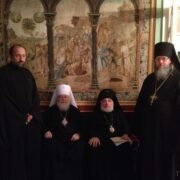
With Metropolitan Hilarion, Archb. Gabriel and Archim. Roman as a member of menologian commission. Holy Trinity St.Sergius Lavra. 2015
I cannot but help but ask you, as a resident of the United States, about the chaos caused in American society by adherents of the “Black Lives Matter” (BLM) movement. Why did this happen? How serious will the changes to the social and political landscape of the country be, and how might this affect the life of the Orthodox in America?
I think it is beneficial for us to focus on the illness itself rather than the symptoms. Why has the disorder been occurring? The BLM movement might have any program whatsoever, but it has become a vehicle for the expression of the pain of the Black population of the USA and of people who are not indifferent to injustice. I do not think we will learn any lessons from the past year if we do not attempt to understand the other and his pain, his story, if we do not leave our comfort zone.
Thanks to the freedom of expression guaranteed by the American Constitution, the Russian Church Abroad has been able to make open statements about problems in American society over several decades.
Individualism is a strong point and simultaneously a weak point of American society. Thanks to the freedom of expression guaranteed by the American Constitution, the Russian Church Abroad has been able to make open statements about problems in American society over several decades. We live in a secular country with the same principle of communal existence as in a block of flats: we have rights, but it is incumbent upon us to respect the rights of those whose way of life does not suit us. I suppose that the changes in the socio-political landscape will continue with respect to protecting the rights and civil liberties of various social and racial communities, and intensification of secularization in the legal and cultural realms. At the same time, we ought to remember that however Western society might declare itself to be secular, it is pervaded by Christian values. Let it suffice to point out that the feat of serving people, self-sacrifice, and charity are accorded a very high position in the value system of the modern Western intellectual.
Let it suffice to point out that the feat of serving people, self-sacrifice, and charity are accorded a very high position in the value system of the modern Western intellectual.
What is the main lesson that you have taken away from your years of service to the Church?
Probably a lesson about how unproductive various fears are, and about how one must do everything within one’s power to solve practical issues, while attempting to express one’s stance for the benefit of a cause, regardless of how popular it might be. If we see an unproductive situation that concerns us and we are afraid to initiate a conversation about it, then we ought to blame no-one but ourselves for continuing to be in circumstances that leave something to be desired.
If we see an unproductive situation that concerns us and we are afraid to initiate a conversation about it, then we ought to blame no-one but ourselves for continuing to be in circumstances that leave something to be desired.
A final question: in what words from Sacred Scripture do you find inspiration or solace in difficult moments?
“Though I speak with the tongues of men and of angels, and have not charity, I become as sounding brass, or a tinkling cymbal. And though I have the gift of prophecy, and understand all mysteries, and all knowledge; and though I have all faith, so that I could remove mountains, and have not charity, I am nothing. And though I bestow all my goods to feed the poor, and though I give my body to be burned, and have not charity, it profiteth me nothing. Charity suffereth long, and is kind; charity envieth not; charity vaunteth not itself, is not puffed up, Doth not behave itself unseemly, seeketh not her own, is not easily provoked, thinketh no evil; Rejoiceth not in iniquity, but rejoiceth in the truth; Beareth all things, believeth all things, hopeth all things, endureth all things. Charity never faileth: but whether there be prophecies, they shall fail; whether there be tongues, they shall cease; whether there be knowledge, it shall vanish away. For we know in part, and we prophesy in part. But when that which is perfect is come, then that which is in part shall be done away. When I was a child, I spake as a child, I understood as a child, I thought as a child: but when I became a man, I put away childish things. For now we see through a glass, darkly; but then face to face: now I know in part; but then shall I know even as also I am known. And now abideth faith, hope, charity, these three; but the greatest of these is charity.” (I Cor. 13: 1–13).


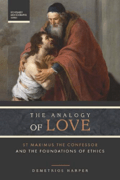
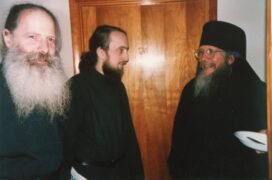


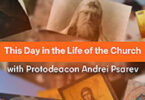







Dear Deacon Andrei:
Christ is in our midst!
Toward the end of your writing, you state:
“If we see an unproductive situation that concerns us and we are afraid to initiate a conversation about it, then we ought to blame no-one but ourselves to be in circumstances that leave something to be desired.”
This philosophy of not saying anything has been my gripe about church (OCA) politics for the past decades. I have come to the conclusion that there are three types of parishioners when it comes to church “issues” :
1. Those who know what is going on but refuse to say anything because it is “my church right or wrong.” Also: the parish council/the clergy know what they are doing.
2. Those who know that something is amiss, but like ostriches they purposely burry their heads in the sand preferring not knowing what is going on, ala Sargent Schultz of Hogan Heroes fame: “I know nothing.”
3. Those of us who rail against the scandalous things happening. But our voices fall on the deaf ears of our hierarchy.
So, other than giving voice to our concerns, there is nothing more that can be done. It is all too frustrating and spiritually dangerous for our souls at times. But what else are we to do? There is nowhere else to go. There are no other alternatives. We just must bear this cross and endure. At least our souls rest easy that we did say something.
XC,